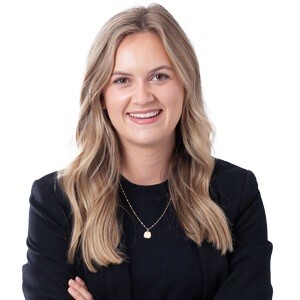Q&A: A conversation with Alfred Burgesson, 2025’s Emerging Leader Award recipient
Why It Matters
Recognizing the contributions of young entrepreneurs celebrates those who are shaping the future and inspires the next generation of leaders.

Editor’s note: This story was done in partnership with Public Policy Forum. Read our editorial and ethical standards here.
Alfred Burgesson is shaping the future of entrepreneurship through technology and innovation.
Burgesson is the recipient of this year’s Emerging Leader Award, an annual recognition by the Public Policy Forum.
According to the Public Policy Forum, the award has acknowledged the contributions of young Canadians who personify leadership in public policy and civic discourse since 2005.
Burgesson is a leading example of this, as the founder and CEO of The Tribe Network.
He founded his non-profit four years ago, after noticing a significant gap in support for BIPOC entrepreneurs. Headquartered in Halifax, The Tribe is a hub for members to access free resources, programming and mentorship designed for entrepreneurs of all sizes.
His organization also provides grants to entrepreneurs. Burgesson is now on track to launch a $20 millionventure fund to provide direct support to budding business leaders. “I’m someone who’s been on the outside as a protester. I’m someone who’s gone on the inside to provide access to research and data and knowledge. And then I’m also someone who’s then gone on the outside to help implement,” he said.
“There are many ways you can influence policy. And I think it’s just a good reminder for people that you don’t have to fit in the box.”
Burgesson’s achievements have been extensive. He’s been recognized as a 30 under 30 Innovator and a Top 50 CEO by Atlantic Business Magazine and a Changemaker by Globe and Mail’s Report on Business.
He’s also served as an advisor to the Prime Minister of Canada, First Nations Chiefs and Senators, as well as co-chaired Canada’s first-ever State of the Youth Report.
Here’s Future of Good’s conversation with Alfred Burgesson, which has been edited for clarity and brevity.
Q: Congratulations on winning the Emerging Leader Award. How does it feel to receive this recognition?
A: “It does feel a bit surreal. I was kind of surprised to get the call and to know that I was getting this award. Because I feel like I’m not the typical policy person And honestly, you know, after having time to actually reflect on what I’ve been able to achieve over the past decade, I kind of allowed myself to enjoy it and kind of take a moment to reflect. Smell the roses, if you will.
Ultimately this is just an award that recognizes that good work is being done. And definitely not the end. It’s more so the beginning of like, okay, keep doing what you’re doing.”.
Q: How did you start The Tribe Network, what inspired it?
A: “What started the Tribe Network was my own experience as an entrepreneur and my experience being a black entrepreneur in Canada, and really feeling excluded from the entrepreneurship and innovation ecosystem and not seeing myself reflected.
And so I knew that something else needed to exist for a while. But it wasn’t until, you know, getting to spend time working with the Senate of Canada doing some research that it became abundantly clear that my experience, while it was unique to me, it’s a very similar experience that a lot of black and other racialized people are experiencing. And that includes barriers in terms of access to capital, access to networks, lack of accessible mentors or coaches.”
Q: Can you explain your personal experiences and the moments you realized there were differences for you?
A:“I would walk into a publicly funded innovation hub, and I didn’t see anyone in there that looked like me, from the membership or the staff. If these spaces are being publicly funded, you would hope that it’s representative of Canada.
If I’m not in here, if I don’t see my community in here, then they’re missing out on an opportunity. The light bulb moment was really thinking like something different needs to exist that is able to serve the fullness of Canada’s potential.”
What kind of impact have you seen your organization make so far? Is there a success story that stands out to you?
“I do think of success on two levels. One, just being the fact that we exist and the fact that we’re able to provide black entrepreneurs a physical space where they can access a working space for free and access to technology, access to our team. I think that’s a success. So that’s number one.
And number two, is just the journey of watching an entrepreneur come to Tribe with an idea and then having our team support them and connect them with resources and ultimately seeing them go from an idea to a product that is solving a problem. It’s creating jobs for people.
That’s the impact that we want to have, is we want to enable and empower our members to bring their ideas to life to solve problems and to also have an economic impact while doing it.”
Q: How do you think the landscape is changing or what needs to change for BIPOC entrepreneurs in Canada?
A: The ecosystem is becoming more welcoming of racialized and underrepresented founders. I’m also seeing an increase in the talent from our communities and more people are visible and more people are learning and iterating and developing their capacity to be great entrepreneurs.
Montreal hosts Startupfest every summer and Tribe has been involved. I’ve been there as a judge and as a program supporter for the Black Entrepreneurship Prize presented by Rep Matters. I’ve watched and seen the community kind of grow through that alone.
A couple of years ago being there and not seeing as many people pitching or the level of readiness maybe wasn’t there. But now, the judges were literally debating about who should be in the top 10 because the talent was so good.
However, I do think we can’t leave all this to just the federal government to solve. The federal government has had some programs in place for Indigenous entrepreneurs, female-led businesses and black entrepreneurs specifically. I think provincial governments need to step up as well to mask that support for our economies.
We need to see more industry folks getting involved and supporting whether it’s procurement opportunities or looking at corporate venture capital opportunities. I see a lot of growth coming from our entrepreneurs. However, I definitely want to see more support from other stakeholders to ensure that our entrepreneurs are getting the support that they need.”
Q: Do you have a piece or one piece of advice you would share with a person of colour who’s trying to pursue entrepreneurship?
A: “If you are feeling isolated, understand that entrepreneurship is a hard journey for anyone, no matter the colour of their skin. But there are barriers that we face. And one way to overcome these barriers is to simply find your tribe.
You don’t always have to look to get accepted by the people who may not believe in you. Move on, find the people that do believe in you and work with them, soak up that, use that energy to keep going.”
Q: What’s next for your organization? Do you have any initiatives that you’re excited about?
A: “Since starting Tribe, we’ve been highly concentrated in Atlantic Canada. I think over the next couple of years, expansion across the country is definitely something of interest to us, whether that may be partnerships with post-secondary institutions or partnerships with existing business accelerators and incubators across the country, or partnership with corporate folks that want to have a line of fight to emerging technologies.
We’re launching a venture fund, because access to capital remains an issue for our founders. While we’re able to provide non-dilutive grant funding and Tribe has referred many founders to other financial institutions, we feel as though there’s still a gap
There are great ideas in our network and problems worth solving, and we would love to be able to invest greater funds into our members to ensure that they can execute on their ideas and bring their products to life to solve big problems.”
Burgesson will receive the Emerging Leader Award on April 24.
“I’m someone who’s been on the outside as a protester. I’m someone who’s gone on the inside to provide access to research and data and knowledge. And then I’m also someone who’s then gone on the outside to help implement,” he said.
“There are many ways you can influence policy. And I think it’s just a good reminder for people that you don’t have to fit in the box.”

